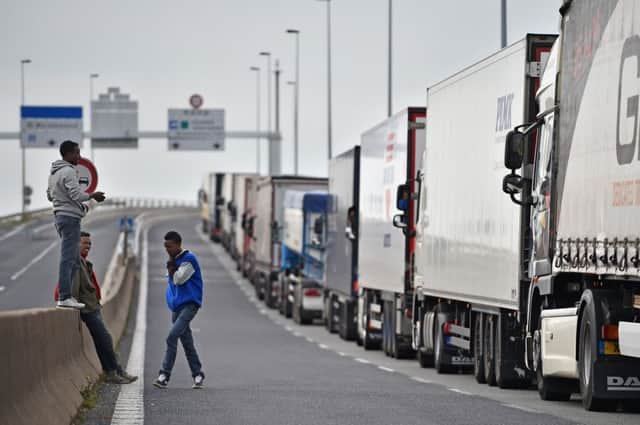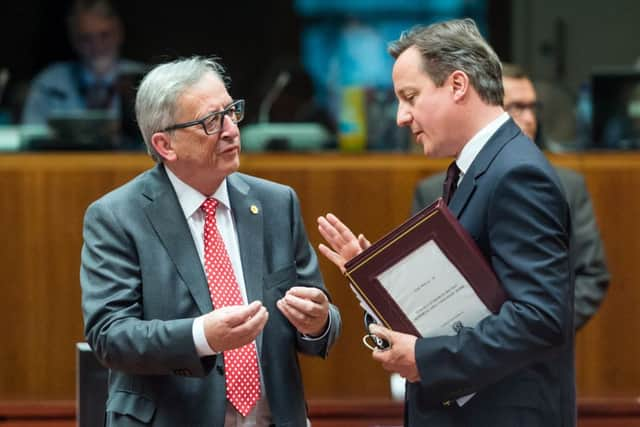How asylum seekers stole David Cameron’s thunder


During the 2001 Conservative Party leadership election – eventually won by Iain Duncan Smith – candidate Kenneth Clarke took a bold step: he spoke sympathetically about asylum seekers.
Addressing a conference of the Scottish Tories in Perth, Clarke highlighted how those attempting to come to the United Kingdom to make new lives had been demonised. They were only doing, he told an elderly and largely unimpressed audience, what anyone in the hall might have done in order to improve their lot and that of their families.
Advertisement
Hide AdAdvertisement
Hide AdClarke’s compassionate analysis was especially surprising because, during that year’s general election campaign, the Conservatives had done a very great deal to exploit public disquiet over immigration levels. Perhaps the most controversial stunt was when former Home Office minister Ann Widdecombe travelled on a cross-channel ferry asking British passengers loaded questions about their immigration concerns.


Fourteen years later, the issue of immigration remains a major British concern. It’s a matter that engages supporters of all political parties, yet the Conservatives seem to find it especially thorny.
Last week, immigration moved back to the top of the agenda, when European leaders – participating in a summit in Brussels – attempted to force Britain to take quotas of refugees who had made their way across the Mediterranean from Africa and Syria.
David Cameron rebuffed the demand that Britain should take more asylum seekers fleeing war and human rights abuses. But while his stance may have played well with a majority of Brits – both north and south of the Border – the timing could not have been worse for Cameron.
The Prime Minister went to Brussels hoping to reform the UK’s relationship with the EU. His promised referendum on membership looms (it will take place before the end of 2017) and Cameron could have done without clashing with those leaders he hopes to persuade to grant concessions to the UK.


The German and Italian governments led demands that the UK should take a proportion of 150,000 migrants who have arrived on mainland Europe after fleeing Africa and Syria but, rather than entertaining the idea, the PM used Britain’s opt-out to reject the suggestion that more should cross the English Channel.
It was a move that sparked a lengthy and often ill-tempered debate in Brussels, where leaders of all participating nations were mindful of the fact that antipathy towards great numbers of immigrants is not a peculiarly British condition.
The president of the European Commission, Jean-Claude Juncker, proposed a compulsory distribution scheme which would have seen all member states take a “fair share” of the tens of thousands who have fled their home countries in the past year, but there was strong opposition to this idea from a number of countries, not least Hungary, which has built a four-metre-high fence to prevent migrants from entering.
Advertisement
Hide AdAdvertisement
Hide AdEventually, other leaders agreed to resettle around 60,000 migrants currently in Italy. But this was a hard-won agreement after a messy and intemperate closed-door session.
The Prime Minister travelled to Brussels expecting considerable support from his European counterparts for his demands for a new settlement between the UK and the EU. Europe’s key players recognise that Cameron is under considerable pressure from his own back benches and, since they would prefer that the UK remains part of the European family, are prepared to make allowances, primarily around the PM’s desire to opt out of the central EU objective of “ever closer union”.
But the row over migrants overshadowed his carefully prepared presentation to fellow leaders and he was afforded a meagre ten-minute slot to make his case.
For the pro-European Cameron, this will have been deeply frustrating. Although he will campaign for the UK to stay inside the EU, he must be seen to be fighting hard for the concessions his backbenchers desire.
After speaking at the summit, Cameron said he was delighted that the process of reform and renegotiation of the UK’s membership of the European Union was properly under way. He tweeted that “significant progress” had been made.
Significant progress, however, is a subjective judgment and it is clear that there remains much for the Prime Minister to do.
In loosening the ties that would bind the UK to that “ever closer union”, Cameron wants to increase the sovereignty of national parliaments so that blocs of them could veto EU legislation and curb EU immigration by cutting benefits. Given the reciprocity that exists between member state, these are complex processes and the UK will have to rewrite treaties agreed by all members. If the UK is to strike a different tone in its relationship with the EU, then all members of the family will have to be consulted and then give their blessing.
So complex are the issues at hand that the PM has admitted that the changes he seeks are unlikely to be made before the referendum is held. Instead, the UK government will seek legally binding guarantees that EU treaties could be changed at some future point.
Advertisement
Hide AdAdvertisement
Hide AdThe Prime Minister is walking a tightrope on the future of the UK’s place in the EU and the migration crisis threatens to shake it.
But it is not just the fact that the migration issue has derailed Cameron’s “standing up for the UK in Europe” narrative that should cause him concern. He must also consider how to address the matter of whether the UK actually helps those new migrants, desperate to rebuild their lives in safety.
The UK has a long tradition of lending a helping hand to those facing persecution overseas. From Ugandans in fear of Idi Amin to Chilean nationals persecuted by General Pinochet, asylum seekers have seen the UK as a place of security. The support given to these desperate people has not always been widely supported by the public.
The Migration Observatory at Oxford University carried out some useful research in advance of last year’s Scottish independence referendum which shows that a majority remain opposed to higher numbers of immigrants.
Polling, which was conducted on behalf of the Migration Observatory by YouGov, found that, while attitudes towards immigration in Scotland are less negative than in the rest of Britain, there is no majority in favour of increasing or even maintaining current levels.
In Scotland, 58 per cent support reduced immigration, while only 41 per cent think immigration is good for the country. In the rest of Britain, 75 per cent support reduced immigration.
If we expect leaders to be prepared to make difficult decisions in the face of public opinion, the current circumstances may leave those who support allowing more migrants into the country sorely disappointed.
In the coming EU referendum campaign, Cameron will be up against a movement which, in large part, concerns itself with immigration as much as it does with European bureaucracy.
Advertisement
Hide AdAdvertisement
Hide AdUkip leader Nigel Farage showed just how potent fear of the other can be during the recent general election campaign, when his party won the third largest share of the popular vote (returning just one MP in the process).
The UK’s reputation as a charitable, welcoming nation may take a hammering as the Prime Minister tries to balance what many believe to be the moral imperative of helping others with an EU referendum campaign during which his opponents can be expected to play dirty, and scaremonger about a nation overrun.
On Friday, Farage said Europe’s attempt to deal with the migrant crisis had been a disaster for EC president Juncker.
Farage said: “He has started to implement the EU’s common asylum policy… and it’s based on burden-sharing, which means that any migrants that arrive in Greece and Italy will be accepted there could then be shared out among the other countries in the EU. But the message last night was clear that the answer from northern Europe was ‘no’.”
Farage added: “All across northern Europe, electors are voting for parties who are saying ‘we are not prepared to go on accepting limitless number of migrants’ and, frankly, I think Mr Juncker’s common asylum policy is holed below the waterline.”
According to Farage, it was inevitable that there would be no treaty change at all.
And while the PM was under attack from the anti-immigration Farage, Labour joined in, with shadow foreign secretary Hilary Benn claiming Cameron was “signalling retreat while pretending that all he ever wanted was a post-dated cheque”.
So, how will the Prime Minister persuade voters that EU membership is in their interests, especially when his opponents have the immigration card to play?
Advertisement
Hide AdAdvertisement
Hide AdWell, although Cameron has spoken repeatedly about the benefits of membership, about the positives that being part of the European Union brings to the UK, it appears he is ready to go negative.
According to an account of a meeting with another – unnamed – EU leader, the Prime Minister plans to warn of the risks of departure. It is a strategy that worked during the Scottish independence referendum when the pro-UK Better Together was dubbed “project fear” by one of its own staff.
A note of Cameron’s meeting with the other leader states that he believes “people will ultimately vote for the status quo if the alternatives can be made to appear risky”.
According to the document, the Prime Minister has formulated a modest and “achievable” reform package (which, of course, he will spin as being something far more substantial) in order to secure the agreement of fellow EU leaders.
The note states that the PM’s “firm aim was to was to keep the UK in the EU” and said he would base part of his campaign on highlighting the country’s importance in areas such as foreign policy and defence.
According to Farage, the note proved the PM was “conning people” when he said he was open-minded about the UK’s future in Europe.
When asked by journalists about the note, Cameron said he wanted to make a “wholly positive” case for the UK to remain in a reformed EU but that he would not rule out anything if he did not get the deal he wanted.
It sounded like an attempt to appear tough rather than a sign of true defiance. Cameron wants the UK to stay in the EU and he will do all he can to make it look like he’s fighting for change when really he’s tinkering around the edges.
Advertisement
Hide AdAdvertisement
Hide AdIt would be a straightforward enough plan, but the migration crisis has added a layer of complication to the mix. Will the PM choose the easy option and ignore those in need, or will he risk his opponents’ scaremongering by doing what many believe to be “the right thing”?
If anyone close to the PM remembers Ken Clarke’s 2001 campaign speech, it may be that those migrants in desperate need will wait a long time before they can rely on the UK for help.